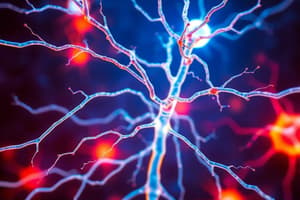Podcast
Questions and Answers
What are the two branches of the autonomic nervous system, and how can we characterise their functions?
What are the two branches of the autonomic nervous system, and how can we characterise their functions?
- Sympathetic and parasympathetic; one prepares the body for action, while the other promotes relaxation and digestion (correct)
- Central and peripheral; one controls the brain and spinal cord, while the other manages sensory and motor functions
- Sensory and motor; one processes sensory information, while the other controls muscle movements
- Somatic and autonomic; one controls voluntary movements, while the other regulates involuntary bodily functions
What happens at the level of the spinal cord?
What happens at the level of the spinal cord?
- Processing of visual and auditory stimuli
- Integration of sensory information and initiation of motor responses (correct)
- Production of cerebrospinal fluid and protection of the brain
- Regulation of hormone secretion and metabolic processes
How and why do drugs used to treat psychological conditions, such as depression, cause side-effects in the body?
How and why do drugs used to treat psychological conditions, such as depression, cause side-effects in the body?
- They interfere with the functioning of the autonomic nervous system, causing disruptions in vital organ functions
- They alter the structure of the peripheral nervous system, leading to sensory disturbances
- They may affect neurotransmitter levels in other parts of the body, leading to unintended physiological effects (correct)
- They directly target the central nervous system, affecting cognitive functions
What are the three divisions of the peripheral nervous system?
What are the three divisions of the peripheral nervous system?
What are the different forms of protection offered to the central nervous system?
What are the different forms of protection offered to the central nervous system?
What are the 3 membranes of the meninges and how do they differ?
What are the 3 membranes of the meninges and how do they differ?
Flashcards are hidden until you start studying




